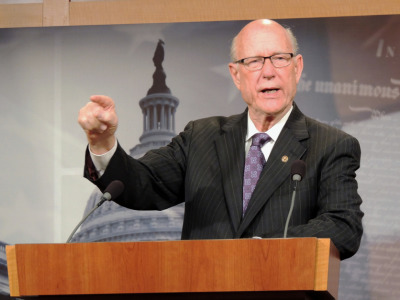Leaders of the Senate Agriculture Committee are working to finalize key details of their draft farm bill, including changes to the Agriculture Risk Coverage program, with hopes of bringing the legislation out of committee sometime in June.
Sources who have been in contact with congressional staff say that a number of issues were still in play heading into the week-long Memorial Day recess, including the commodity and conservation titles.
Rules for the Conservation Reserve Program also were still under discussion. The House farm bill would increase the cap, now 24 million acres, to 29 million acres. The Senate committee, however, has been looking at a much smaller increase, perhaps to 25 million acres.
Senate Agriculture Chairman Pat Roberts, R-Kan., told Agri-Pulse that the larger increase sought by many wildlife groups was too costly.
Two key differences with the House already appear clear. The Senate bill would keep the Conservation Stewardship Program in operation and contain an energy title to fund assistance for renewable energy, biorefinery projects and other priorities. The House bill would eliminate both CSP and the energy title and would provide no mandatory funding for energy programs.

Senate Ag Committee Chair Pat Roberts, R-Kan.
The sources also said that given the work still to be done, including finalizing cost estimates from the Congressional Budget Office, and the fact that the Senate is not in action this week, means the week of June 11 is likely to be the earliest that the committee could act on the draft bill.
But the committee staffers “really have a sense of urgency,” said one source who has talked to them in recent days. Another source said committee aides were “still working through multiple titles” of the bill.
This source also said that the senators and staff appeared to have in mind writing a bill that tracks closely to what they believe will ultimately be enacted into law rather than setting up negotiating positions with the House Agriculture Committee.
Senate Majority Leader Mitch McConnell, R-Ky., confirmed in an interview with The Wall Street Journal last week that the Senate bill doesn’t need to expand work requirements for able-bodied adults who participate in the Supplemental Nutrition Assistance Program, a key feature of the farm bill that Republicans are struggling to push through the House.

Senate Majority Leader Mitch McConnell, R-Ky.
McConnell also suggested that he’s not concerned that a bipartisan bill could help Democrats who are running for election in Republican-leaning farm states, which would include Heidi Heitkamp of North Dakota, Joe Donnelly of Indiana and Jon Tester of Montana. House GOP leaders see SNAP work requirements as a potent political issue in fall congressional elections.
“It’s important for this Republican Senate not to leave the farm bill on the sidelines. If the Democrats running in those states vote for it, that’s fine,” McConnell told the Journal.
McConnell told Agri-Pulse last month that he had asked Roberts to include in the bill provisions to legalize the production of industrial hemp. McConnell also pledged to bring the bill to the floor as soon as possible once it is out of committee. “We’ll be in conference hopefully before the summer is out resolving the issues,” McConnell said.
To underscore the importance of McConnell and the hemp issue to the bill, Roberts recently told a reporter that he was optimistic about floor action and offered four letters - “H-E-M-P" - to justify his confidence in McConnell's interest in passing the legislation.
The ARC issue has been one of the thorniest for Roberts to resolve. Committee members John Thune, R-S.D., and Sherrod Brown, D-Ohio, have introduced legislation that would make a series of improvements to the program and cap Price Loss Coverage program reference prices to offset the cost of an expected increase in ARC payments.
Southern members of the committee, including John Boozman, D-Ark., have been pushing back against the proposal. Roberts has also been resistant to making significant changes in ARC and PLC, expressing concern that it would upset the political balance that the bill needs.
Sen. Chuck Grassley, R-Iowa, confirmed Tuesday that he expects his payment limit provisions to be in the bill. Roberts had earlier told Agri-Pulse that he was working with Grassley on the issue.
Grassley wants to restrict farm operations to having one non-farming participant who could qualify for $125,000 a year in subsidies as a manager.
The House bill would loosen eligibility rules in several ways, including by exempting pass-through entities from the existing means test, which bars subsidies to individuals with adjusted gross income of more than $900,000 a year. The House bill also would allow owners of LLCs and S corporations to qualify to receive up to $125,000 in payments each year.
The future of the House bill remains uncertain. The bill failed on the floor May 18 when a group of conservatives demanded that the House act first on immigration legislation. The House last week extended to June 22 the deadline for the bill to be reconsidered on the floor, but it is not clear when and how the immigration issue is going to be resolved.
For more news, go to www.Agri-Pulse.com


